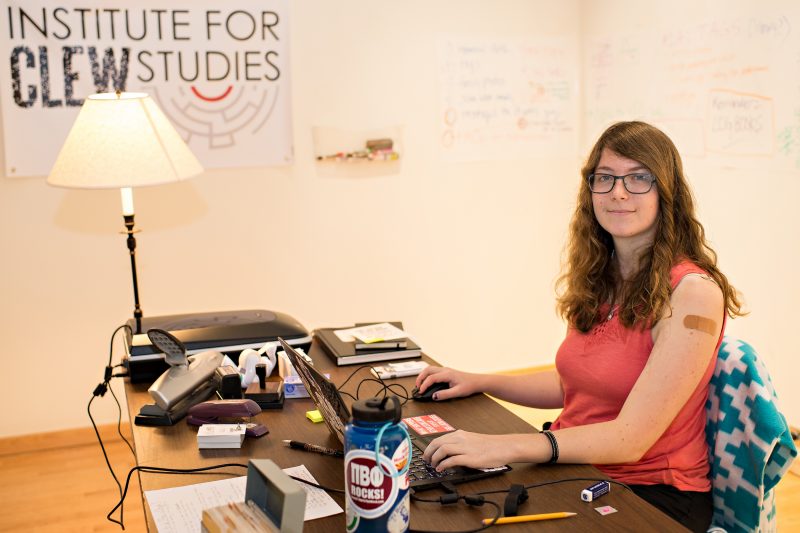Preserving Snippets, Smidgens and Scraps of History Mary Catherine Greenleaf '19 collected and archived artifacts revolving around the Prohibition-era murder of Franklin Crosby Bearse.
“My passion lies within the realm of the Digital Humanities — that combination of art and computer science — and having the chance to explore this field was an invaluable experience for me.”
Mary Catherine Greenleaf ’19
Hometown: Erie, Pennsylvania
Majors: Computer Science and Studio Art
Q: What was your summer research project?
I assisted Clover Archer, director of the Staniar Gallery, in her long-term art project — the investigation of the unsolved murder of her great-grandfather during Prohibition. Though this project began as a glimpse into her personal history, it has transcended its original confines and shifted into a meaningful investigation of granular history. Though memories of who we are as individuals will disappear through time, people leave behind objects that lend clues to their past lives. Clover is searching for these objects in order to piece together the lives of the people surrounding her great-grandfather to illustrate the significance of each individual life and story. I am assisting Clover with creating a digital archive to house these stories, as well as doing research, filming, and existing as a piece of this performance art as a staff member of the Institute for Clew Studies.
Q: What did an average day for you look like?
My office was set up in the corner of the mostly empty Staniar Gallery in the Lenfest Center for the Arts. Sometimes I scanned objects and drawings, retyped articles and hung artwork on the gallery walls. Other days, I fought with web design — coding with CSS and PHP to create a website — prototype specialized fonts, and attempt to create solutions to unique problems and ideas that have risen within the archives. Every day I greeted visitors to the office, provided tours of the project, and kept a logbook chronicling my efforts that will become its own part of the archive.
Q: What was the most interesting thing you learned while working on this project?
The process of coding a website taught me interesting and invaluable skills, and I think I really learned how to look into something I’ve never learned and alter it to make it do what I need it to. I came into the project not knowing CSS or PHP, but through trial and error I began to understand it and utilize it to my advantage.
Q: What was the biggest challenge you faced?
Not knowing any coding and having to dive into web design head first was definitely my greatest personal challenge. I overcame this challenge and created a workable website with the desired design, though it definitely wasn’t an easy process getting there!
Q: Did you have any mentors during this time?
Clover was a wonderful mentor to me over the course of the summer. She directed me and aided me throughout the project, and I really feel as if I grew a lot as a person through her guidance. I strove to make her design goals a reality, and, in the process, learned an incredible amount. She challenged me to complete tasks I never thought I could accomplish (learning CSS, for example), and we worked together to create a product that we both can be proud of. She encouraged me to include my own passions in this project, such as designing a game based on the archives and creating an infomercial about the Institute, and she put great emphasis on making this a worthwhile experience for both of us.
Q: Did this experience impact your studies or future plans in any way?
This experience served to really emphasize to me how much I love my field of study and that I’m going down the right path. My passion lies within the realm of the Digital Humanities — that combination of art and computer science — and having the chance to explore this field was an invaluable experience for me. It really affirmed to me that I know what I love and that I have the ability to further pursue my passions.
Q: How did W&L prepare you for this experience?
The Digital Humanities program at W&L really prepared me for this experience. They guided me and taught me what I needed to know in regards to web design and were always available to help whenever I felt as if I was stuck indefinitely at a coding-created roadblock. My liberal arts education also helped in general; I am free to pursue my two seemingly separate passions of art and science, and combine them into something beautiful.
Q: Why is this kind of experience important to W&L students?
This allows for hands-on experience doing something unique and interesting, and really gives you a sense of the variety of research options and opportunities any field of study may have.
 Mary Catherine Greenleaf ’19
Mary Catherine Greenleaf ’19
You must be logged in to post a comment.